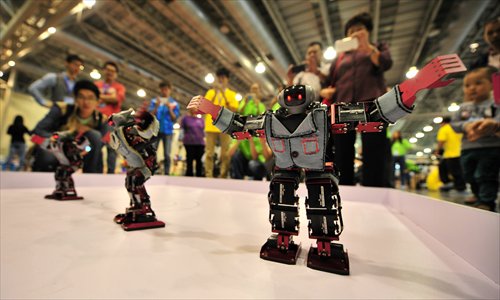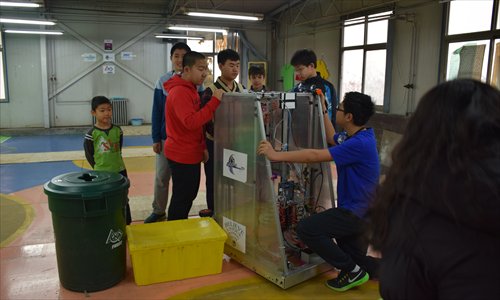A team of Chinese schoolboys prepare for major US robotics competition
Fifteen middle and high school students in Beijing, who come from 11 different schools, have set out to compete in the FIRST Robotics Competition, scheduled to be held in Silicon Valley in the US in April. The team, organized like a tech start-up, is giving them the freedom needed gain insights into teamwork, competition and the education system.

Robots designed by students dance on stage at the China Robot Competition, October 10, 2014. Photo: IC
It was mid-February and the campus of the Beijing University of Posts and Telecommunications (BUPT), in the northwest of China's capital, was serene and empty, most of its students and faculty members having returned to their hometowns for the Spring Festival.
But in a loft tucked away at the top of a building filled with quiet classrooms, there was frenzied activity. Fifteen boys from some of Beijing's top middle and high schools were running the final tests on their latest creation - a recycling robot that the team recently designed, welded, machined and programmed for the FIRST Robotics Competition, scheduled to be held in Silicon Valley in the US in April. This year, the theme of the competition is "recycle rush." Two days from now, their robot will be packed up and shipped to the US in preparation for the event, where they will be the only Chinese team competing against 58 other teams from around the world between April 1 to 4.
Making loud buzzing and hissing sounds, the chubby, cube-shaped robot moved slowly around the loft, searching for the recycling bins and containers scattered around the space, while the boys controlled it remotely with their laptops and control pads. It scooped up the bins and containers, moving them to the designated scoring zones and stacking them on top of one another.
In the competition, the teams will form three-way alliances with other teams and compete to see how fast and accurately they are able to stack containers in scoring zones. The winning teams from the Silicon Valley leg will enter the FIRST Robotics Championship in St. Louis, Missouri three weeks later, and compete for over 20 awards that honor excellence in team spirit, engineering, design and industrial safety, among other categories.
The competition aims to encourage young people's interest in science and technology and to train future engineers through the non-profit FIRST (For Inspiration and Recognition of Science and Technology) program, founded in 1989 in the US. Yet, for this team and its organizer, it can also redefine their understanding of teamwork, competition and even the spirit of learning.
An independent team
The story of the team began last November, when Zheng Wei, the founder of the team, put up a public post on social networking app WeChat, calling for students interested in robotics to help him form a team and enter the competition.
"Chinese students grow up amid heavy workloads and endless exams. I want to bring to them what Western kids are doing and train them to compete with them," Zheng, also a sponsor of the team, told the Global Times.
Zheng, born in the 1970s, graduated with a master's degree from BUPT in 2002. After that, he worked as an engineer at Chinese and foreign telecommunications companies including Huawei, Qualcomm and China Telecom.
What struck him most in his over 10 years of work experience is how weak China is in terms of core technology when compared with Western countries and the lack of innovation in its technology industry, Zheng said. While the country's education system churns out millions of university graduates each year, over half of them majoring in science subjects, "most of those who work in the IT industry are doing the most basic and menial jobs," he said. "If foreign countries introduce restrictions on the sharing of their technology, Chinese people might soon have no mobile phones to use and end up with landlines only. I wanted to do something to make a change."
This prompted him to explore ways to cultivate young talents who could become China's Bill Gates or Steve Jobs in the future. Zheng helped found Mars Style, an organization engaged in science and technology education. The organization spent 200,000 yuan ($31,980) for the tools and materials needed for the construction of the robots in the competition. "I want to bring the best to the kids, and this competition is one of the top competitions in the world as Silicon Valley is located at the heart of the US's technology hub," Zheng said.
After Zheng posted his WeChat call to arms, interested parents started to contact Zheng about their children participating, and over 20 kids were signed up for the competition within two weeks.
Chinese teams participating in international science competitions is nothing new, but usually such teams are chosen by schools or local governments, and their expenses are usually covered by government funding. Through his WeChat platform, however, Zheng managed to build a team consisting of students who come from 11 different schools, ranging in age from 12 to 18 years old, without any government support. Apart from the 200,000 yuan of help given by Mars Style, the parents of the kids paid the $6,000 registration fee for the competition and the travel expenses for their children to go to and return from the US.
The team is organized like a tech start-up, with 12-year-old An Yi as the team leader, the skinny high school senior Yang Daiming as the spokesperson, and three departments in charge of the robot's programming, hardware designing and marketing.
Most of these students are precocious boys who have ample experience participating in Chinese and international competitions. When Luo Youchen, a 14-year-old student who introduced himself as the team's head of marketing, gave a briefing to local reporters on the team's work so far, he made an impression on them with his combination of confidence, sincerity and worldliness that makes him a skilled speaker. "I feel like you are more mature than many adults," a photographer exclaimed.
"Teams organized by schools usually value results over the process, because the results bring honor to the school's officials. As a non-government project, we put more emphasis on each student's growth and participation," Zheng said.
Disappointed and supportive
According to the competition's rules, students only have six weeks to design and build their robots. In January, they received their challenge and essential building materials that were shipped from the US, and started to build the robot at BUPT, which provided them with a venue.
January is the time when the autumn semester ends at Beijing's middle and high schools and students cram until late at night preparing for the final exams. The exams became many team members' priority, diverting their time and energy away from the robotics project. "Some members quit along the way because they think it's more important to prepare for the exams," An, the vigorous and cheerful team leader, told the Global Times.
Those who remained were not just passionate about science, but had parents who allowed them to spend less time preparing for the exams. "The parents are really supportive. Many of them are deeply disappointed in China's education system," Zheng said.
"I really don't care about my son's exam scores at school. It's more important for him to know where his interest lies and be driven by it," Zeng Yong, mother of Zeng Hao, a participating student, who works in human resources consulting, told the Global Times. At school, she said her son has difficulty adapting to an education system that values obedience to teachers and memorization, while the competition gives him the opportunity to make friends who share his passion and to become motivated to do scientific research and solve problems himself. This April, she will accompany her son to the US for the competition.
Her sentiments were echoed by Feng Jing, An Yi's art dealer mother, who plans to send her son to a US university. "We believe it's important for An Yi to receive his basic pre-university education in China. But for university, we plan to let him study overseas," she said.
A participant in Chinese and international robotic competitions since primary school, An Yi has already had his own understanding of the difference between the Chinese and American education systems. "Competitions in China only value a candidate's technical skills. I remember joining a Chinese competition and accidentally losing my data cable, and when I tried to borrow one from another team, they refused to help me and said 'friendship to an enemy is cruelty to oneself.' In America, teamwork and communication are valued over technical skills, and even if a team didn't perform well in the competition, good teamwork could also lead to awards," he told the Global Times.
While An said he hopes to study engineering at MIT in the future, Yang Daiming, the oldest student on the team now, in his last year in high school, has already received offers from Indiana's Purdue University and the University of Virginia. "It's very likely that the University of Pennsylvania will give me an offer too," he said confidently.
While he hasn't decided which university to go to, he will likely become one of the almost 275,000 Chinese students now studying at US universities, making up the largest contingent among foreign students in the US, according the New York-based Institute of International Education.

An Yi (front) and his team members, make final adjustments to their robot this February, ahead of the robotics competition in Silicon Valley. Photo: Zhang Yu/GT
Newspaper headline: High-tech teens